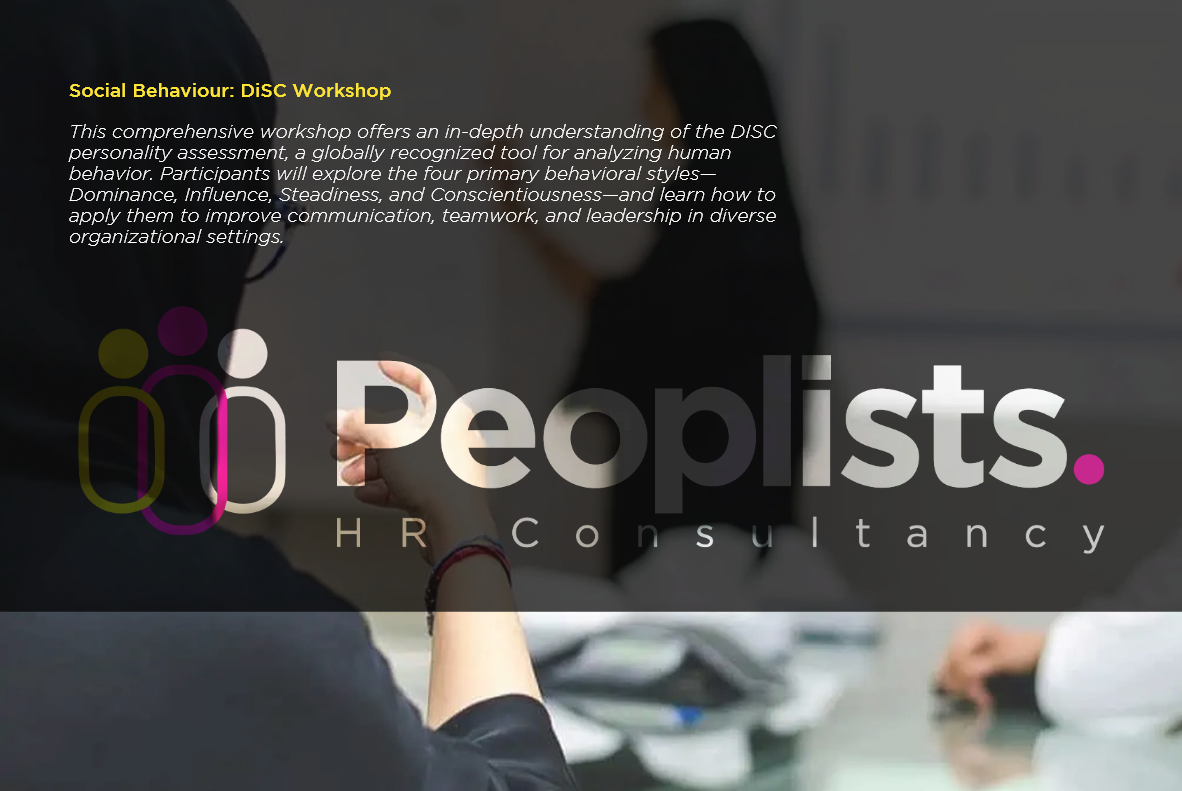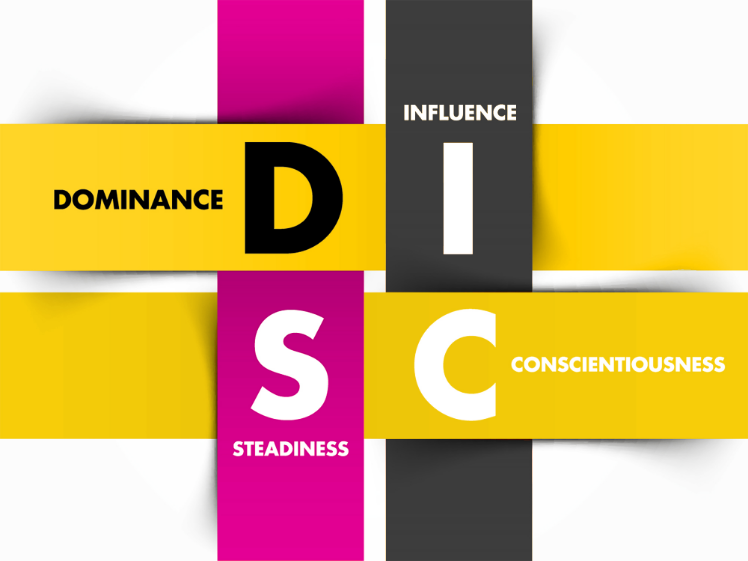
Overview![]()
Description
The DiSC model categorizes behavior into four key personality styles:
D (Dominance): Results-oriented, direct, and assertive.
i (Influence): Sociable, enthusiastic, and inspiring.
S (Steadiness): Supportive, reliable, and cooperative.
C (Conscientiousness): Analytical, detail-oriented, and methodical.
By understanding these styles, participants learn how to adapt their approach to better connect with colleagues, clients, and team members.
Program Highlights
Enhanced Self-Awareness:
Discover your DISC profile and how it influences your behavior, decision-making, and communication.
Improved Communication Skills:
Learn how to tailor your communication style to align with different personality types, reducing misunderstandings.
Team Collaboration:
Understand team dynamics through the lens of the DISC model to build stronger, more cohesive teams.
Conflict Resolution:
Gain strategies to identify and address workplace conflicts constructively using DISC insights.
Practical Applications:
Participate in role-playing exercises, group discussions, and case studies to practice using the DISC model in real-life scenarios
Target Audience
![]() Professionals: Looking to refine interpersonal skills and workplace effectiveness.
Professionals: Looking to refine interpersonal skills and workplace effectiveness.
![]() Managers & Team Leaders: Aiming to lead diverse teams with improved communication and collaboration.
Managers & Team Leaders: Aiming to lead diverse teams with improved communication and collaboration.
![]() Employees: Seeking to enhance team dynamics and personal productivity.
Employees: Seeking to enhance team dynamics and personal productivity.



Learning Objectives of the DiSC Workplace Training Program
The DiSC Workplace Training Program is designed to provide participants with a comprehensive understanding of the DISC behavioral model and how it enhances workplace dynamics. By the end of this training, participants will be equipped with practical tools to improve communication, teamwork, and conflict resolution.
Key Learning Objectives
Understanding the DiSC Behavioral Model:
Gain a clear understanding of the DISC model and its relevance in fostering workplace communication and collaboration.
Self-Awareness Through DiSC:
Identify your DISC personality type and recognize how it influences your work style, decision-making, and interactions.
Tailored Communication Strategies:
Learn techniques to adapt your communication approach for different DISC personality types, ensuring clearer and more impactful interactions.
Enhancing Teamwork and Collaboration:
Discover how to leverage diverse behavioral styles to build stronger, more cohesive teams that value each member’s unique strengths.
Conflict Management Using DiSC Insights:
Develop practical strategies to manage and resolve workplace conflicts constructively, aligning with DISC principles to achieve positive outcomes.
Why These Learning Objectives Matter
Achieving these objectives empowers participants to foster a more harmonious and productive workplace. Whether you’re a team leader, manager, or employee, the skills gained through this program will help you navigate interpersonal challenges and drive organizational success
Learning Outcomes: DiSC Workplace Training Program
By completing the DiSC Workplace Training Program, participants will gain the skills and knowledge to foster a more productive, harmonious, and collaborative workplace. This program ensures practical application of the DISC personality model to enhance professional relationships and team performance.
Key Learning Outcomes
Comprehensive Understanding of DiSC Types:
Clearly define the four DISC personality types (Dominance, Influence, Steadiness, and Conscientiousness) and their core characteristics.
Self-Discovery and Awareness:
Identify your own DISC personality profile through guided self-assessment, gaining valuable insights into your behavioral tendencies.
Tailored Communication Strategies:
Learn to adapt your communication style to align with the unique behavioral preferences of colleagues and team members, reducing misunderstandings and improving collaboration.
Enhanced Relationship Building:
Build stronger, more meaningful professional relationships by recognizing, appreciating, and leveraging individual differences in behavioral styles.
Conflict Resolution and Decision-Making:
Apply DiSC principles to effectively manage workplace challenges, including conflict resolution and strategic decision-making.
Improved Team Dynamics:
Develop actionable strategies to enhance team cohesion, foster collaboration, and create a more inclusive and productive work environment.
Why These Learning Outcomes Are Vital
These outcomes equip participants with actionable skills to:
![]() Improve communication across diverse teams.
Improve communication across diverse teams.
![]() Strengthen relationships for greater workplace harmony.
Strengthen relationships for greater workplace harmony.
![]() Address conflicts with confidence using DISC-based strategies.
Address conflicts with confidence using DISC-based strategies.
![]() Drive better team performance by valuing individual strengths and contributions
Drive better team performance by valuing individual strengths and contributions
Learning Outcomes: DiSC Workplace Training Program
By completing the DiSC Workplace Training Program, participants will gain the skills and knowledge to foster a more productive, harmonious, and collaborative workplace. This program ensures practical application of the DISC personality model to enhance professional relationships and team performance.
Key Learning Outcomes
Comprehensive Understanding of DiSC Types:
Clearly define the four DISC personality types (Dominance, Influence, Steadiness, and Conscientiousness) and their core characteristics.
Self-Discovery and Awareness:
Identify your own DISC personality profile through guided self-assessment, gaining valuable insights into your behavioral tendencies.
Tailored Communication Strategies:
Learn to adapt your communication style to align with the unique behavioral preferences of colleagues and team members, reducing misunderstandings and improving collaboration.
Enhanced Relationship Building:
Build stronger, more meaningful professional relationships by recognizing, appreciating, and leveraging individual differences in behavioral styles.
Conflict Resolution and Decision-Making:
Apply DiSC principles to effectively manage workplace challenges, including conflict resolution and strategic decision-making.
Improved Team Dynamics:
Develop actionable strategies to enhance team cohesion, foster collaboration, and create a more inclusive and productive work environment.
Why These Learning Outcomes Are Vital
These outcomes equip participants with actionable skills to:
![]() Improve communication across diverse teams.
Improve communication across diverse teams.
![]() Strengthen relationships for greater workplace harmony.
Strengthen relationships for greater workplace harmony.
![]() Address conflicts with confidence using DISC-based strategies.
Address conflicts with confidence using DISC-based strategies.
![]() Drive better team performance by valuing individual strengths and contributions
Drive better team performance by valuing individual strengths and contributions
Methodology: DISC Workplace Training Program
The DiSC Workplace Training Program utilizes a combination of interactive and experiential learning techniques to ensure that participants actively engage and develop practical skills. By blending theory with hands-on activities, our methodology ensures that the DiSC personality model is applied effectively in the workplace.
Key Components of the Methodology
Pre-Training Assessment:
Participants complete a DiSC personality assessment before the training session, allowing them to gain insights into their individual behavioral styles and identify areas for growth.
Interactive Facilitation:
Engage in dynamic presentations on the DiSC model, supported by real-world examples and case studies to demonstrate its application in diverse work environments.
Group Activities:
Participate in team exercises designed to practice applying DiSC principles to communication, problem-solving, and conflict scenarios, ensuring immediate real-world relevance.
Role-Playing Scenarios:
Simulate workplace situations where participants can experiment with adapting their communication and collaboration styles to various DiSC personality types, fostering experiential learning.
Small Group Discussions:
Reflect on personal insights and share strategies in facilitated small group discussions, encouraging the exchange of best practices and tailored approaches for improving interpersonal dynamics.
Action Plan Development:
At the end of the session, participants create personalized action plans to implement DiSC strategies in their daily work environment, ensuring long-term application of the training.
Methodology: DISC Workplace Training Program
The DiSC Workplace Training Program utilizes a combination of interactive and experiential learning techniques to ensure that participants actively engage and develop practical skills. By blending theory with hands-on activities, our methodology ensures that the DiSC personality model is applied effectively in the workplace.
Key Components of the Methodology
Pre-Training Assessment:
Participants complete a DiSC personality assessment before the training session, allowing them to gain insights into their individual behavioral styles and identify areas for growth.
Interactive Facilitation:
Engage in dynamic presentations on the DiSC model, supported by real-world examples and case studies to demonstrate its application in diverse work environments.
Group Activities:
Participate in team exercises designed to practice applying DiSC principles to communication, problem-solving, and conflict scenarios, ensuring immediate real-world relevance.
Role-Playing Scenarios:
Simulate workplace situations where participants can experiment with adapting their communication and collaboration styles to various DiSC personality types, fostering experiential learning.
Small Group Discussions:
Reflect on personal insights and share strategies in facilitated small group discussions, encouraging the exchange of best practices and tailored approaches for improving interpersonal dynamics.
Action Plan Development:
At the end of the session, participants create personalized action plans to implement DiSC strategies in their daily work environment, ensuring long-term application of the training.
